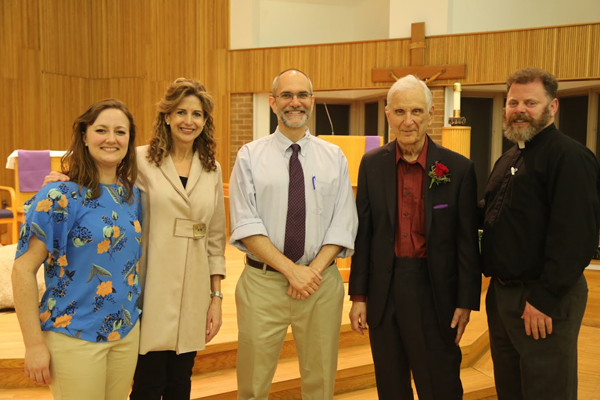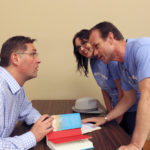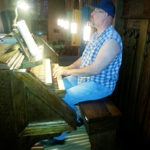By April Rouner
For the Catholic Messenger
IOWA CITY — Can we divorce faith from any particular doctrine about Jesus, or is doctrine, and the content of our faith, really important after all?
David Anders, a national speaker and host of the EWTN radio program “Called to Communion,” told a crowd at the University of Iowa Newman Catholic Student Center March 3 that “doctrine really does matter. It is a necessary aspect of true wisdom and authentic faith. People’s lives have been deeply transformed by God, grace and the moral life.”

Getting together after a talk March 3 at the Newman Catholic Student Center in Iowa City are, left: Claire Sevenich, Newman Center Fellow for Faith Formation-Special Events; Laurie Harris, Newman Center business manager; lecturer David Anders; Dr. Nick Rossi; and Father Jeff Belger, the Newman Center’s director.
Anders spoke from experience. He grew up in the Presbyterian Church and attended a Protestant college and seminary. During his Ph.D. studies in Reformation History at the University of Iowa, he said he “became persuaded of the truth of the Catholic faith.” He and his wife, Jill, and their five children are now members of the Catholic Church. But the journey to Catholicism was bumpy.
In his doctoral studies, Anders’ goal was to justify the Reformation and to confirm “justification by faith alone.” Then he grasped what St. Augustine of Hippo and other Fathers of the Church taught about salvation. “No matter where I looked, the Fathers agreed: salvation comes through the transformation of moral life and not by faith alone,” Anders said.
The ancient doctrine of the Catholic Church made sense. Salvation is about union with Christ and a continual growth into his nature. This realization also helped Anders appreciate church teaching on the sacraments. When he finished his degree in December 2002, “Catholicism seemed like the most sensible interpretation of Christian faith. But, the loss of my childhood faith was shattering. I prayed for guidance.”
Anders said grace saved him. “God showed me I needed more than books and ‘faith alone.’ I needed real help to live my life and to do battle with sins. I found this in the sacraments of the church. Instead of ‘Scripture alone,’ I needed real guidance from a teacher with authority. I found this in the Magisterium of the church. I needed the whole company of saints and Mother Mary in heaven. The Catholic Church was ideally formed to meet my spiritual needs.” He entered the Catholic Church in November 2003.
After relaying his conversion story, Anders asked, “What good can a believer do that a non-believer cannot?” After a pause, he answered: “Believers have a transcendental hope that takes one beyond suffering. I am definitely loved, which makes my life good. Belief in everlasting life can make you happy and at peace … again, life is good.”
He continued, “When we have peace, we can forgive our transgressors and can willingly embrace suffering. Christ pours love and grace into us. Therefore, I am capable of loving God and neighbor with a moral nature.”
Concluding his talk, he posed a question: “How can we know it is all true?” His answer: “There are things we can know from reason and therefore deduce right answers. We know God is the first principle; he is the cause for everything else. And, we also know truth from testimony. Christ has demonstrated his trustworthiness to us.”
Ander’s presentation was the first in an ongoing educational series made possible by the newly endowed Nicholas P. and Helen M. Rossi Center for Faith & Culture at the Newman Center. Dr. Rossi’s vision is “to create an environment where current and future university students are given an opportunity to learn and discuss how faith and culture interface in their daily lives.”
After each speaker forum, students will continue to meet monthly to process and formulate how they can be strengthened in faith relative to culture.
The first speaker through the Center for Faith in Culture was David Anders, a University of Iowa alumnus, Catholic convert and EWTN radio host. The next speaker will be Dr. Hugo Ernesto from Argentina, on June 19, followed by Jay Richards, assistant research professor in the Busch School of Business and Economics at Catholic University of America, on October 23.











